Grief and Loss: Contemporary Counselling Theories for Older Adults
VerifiedAdded on 2020/05/04
|12
|3658
|1416
Essay
AI Summary
This essay critically examines grief and loss experiences in older adults, emphasizing the multifaceted nature of bereavement and its impact on physical, emotional, and social well-being. It highlights the increased vulnerability of older adults to the negative health outcomes associated with loss, such as the death of a spouse, and the diverse responses to bereavement. The essay explores the application of two contemporary theories: Stroebe & Schut's Dual Process Model, which integrates cognitive stress and attachment theories, and Rubin's Two Track Model, which incorporates biopsychosocial functioning and the nature of the relationship to the deceased. The dual process model's benefits and challenges are discussed in the context of counselling older adults. The essay also provides insights into the importance of specialized grief-specific services, such as cognitive behavioral therapy and pharmacotherapy, in treating complicated grief and promoting independence and self-care in the elderly.
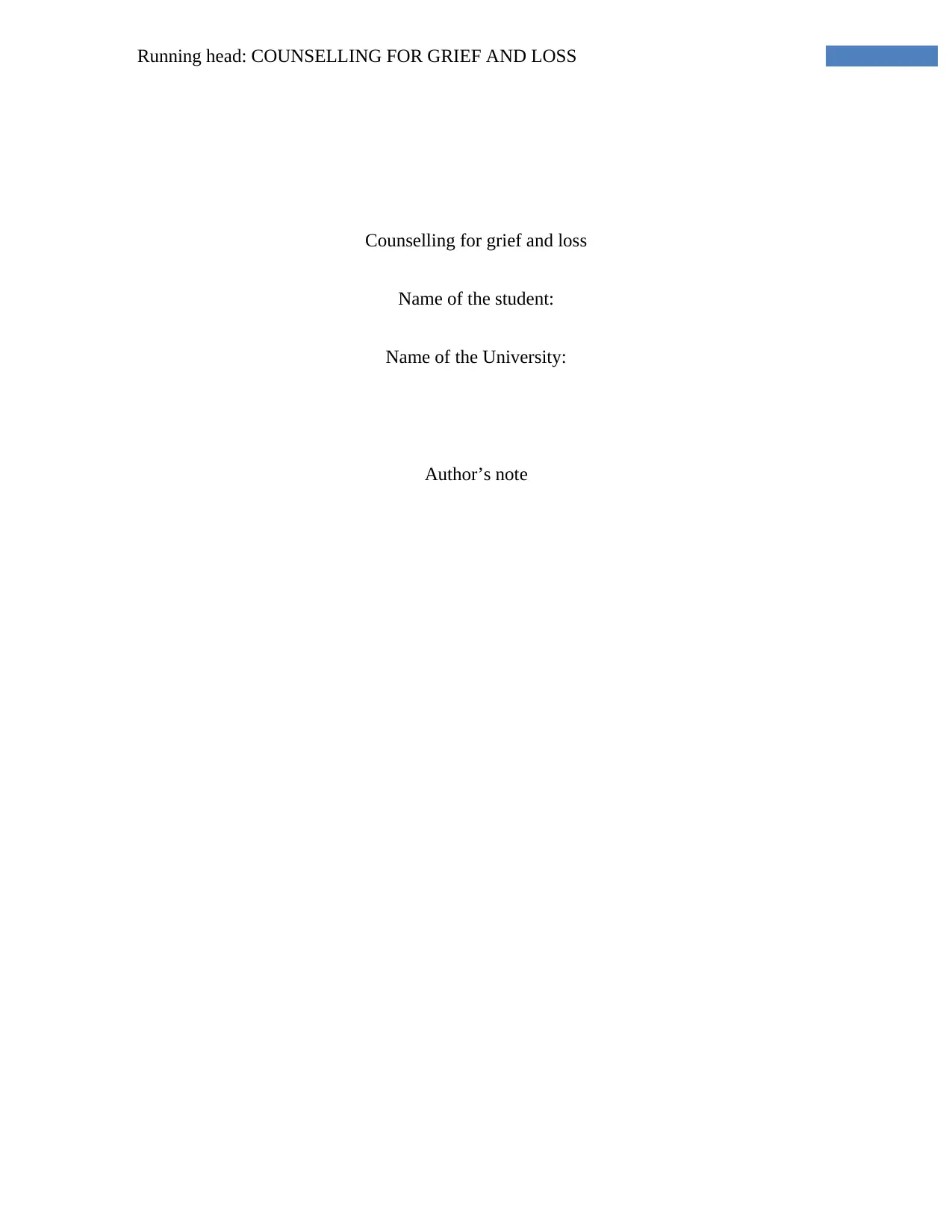
Running head: COUNSELLING FOR GRIEF AND LOSS
Counselling for grief and loss
Name of the student:
Name of the University:
Author’s note
Counselling for grief and loss
Name of the student:
Name of the University:
Author’s note
Paraphrase This Document
Need a fresh take? Get an instant paraphrase of this document with our AI Paraphraser
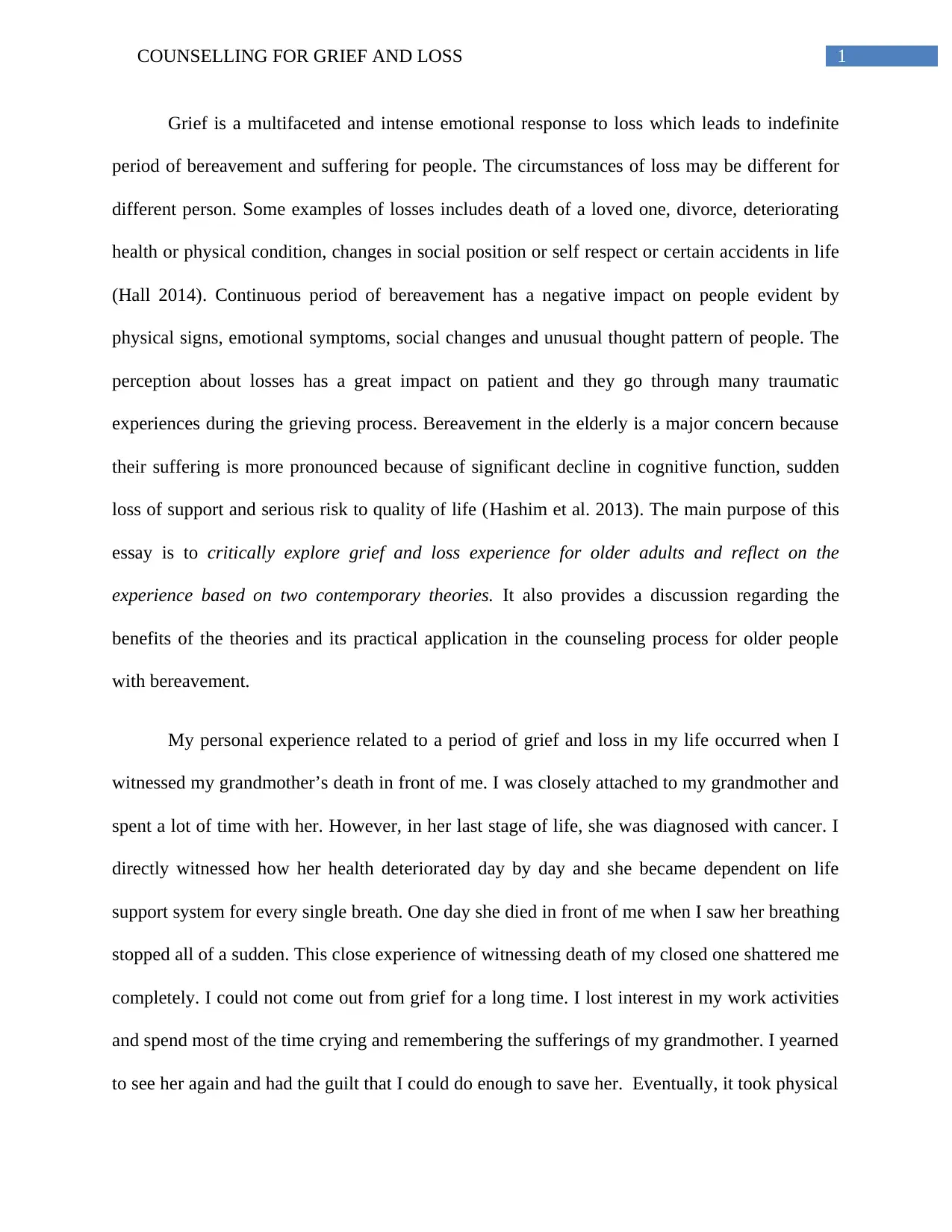
1COUNSELLING FOR GRIEF AND LOSS
Grief is a multifaceted and intense emotional response to loss which leads to indefinite
period of bereavement and suffering for people. The circumstances of loss may be different for
different person. Some examples of losses includes death of a loved one, divorce, deteriorating
health or physical condition, changes in social position or self respect or certain accidents in life
(Hall 2014). Continuous period of bereavement has a negative impact on people evident by
physical signs, emotional symptoms, social changes and unusual thought pattern of people. The
perception about losses has a great impact on patient and they go through many traumatic
experiences during the grieving process. Bereavement in the elderly is a major concern because
their suffering is more pronounced because of significant decline in cognitive function, sudden
loss of support and serious risk to quality of life (Hashim et al. 2013). The main purpose of this
essay is to critically explore grief and loss experience for older adults and reflect on the
experience based on two contemporary theories. It also provides a discussion regarding the
benefits of the theories and its practical application in the counseling process for older people
with bereavement.
My personal experience related to a period of grief and loss in my life occurred when I
witnessed my grandmother’s death in front of me. I was closely attached to my grandmother and
spent a lot of time with her. However, in her last stage of life, she was diagnosed with cancer. I
directly witnessed how her health deteriorated day by day and she became dependent on life
support system for every single breath. One day she died in front of me when I saw her breathing
stopped all of a sudden. This close experience of witnessing death of my closed one shattered me
completely. I could not come out from grief for a long time. I lost interest in my work activities
and spend most of the time crying and remembering the sufferings of my grandmother. I yearned
to see her again and had the guilt that I could do enough to save her. Eventually, it took physical
Grief is a multifaceted and intense emotional response to loss which leads to indefinite
period of bereavement and suffering for people. The circumstances of loss may be different for
different person. Some examples of losses includes death of a loved one, divorce, deteriorating
health or physical condition, changes in social position or self respect or certain accidents in life
(Hall 2014). Continuous period of bereavement has a negative impact on people evident by
physical signs, emotional symptoms, social changes and unusual thought pattern of people. The
perception about losses has a great impact on patient and they go through many traumatic
experiences during the grieving process. Bereavement in the elderly is a major concern because
their suffering is more pronounced because of significant decline in cognitive function, sudden
loss of support and serious risk to quality of life (Hashim et al. 2013). The main purpose of this
essay is to critically explore grief and loss experience for older adults and reflect on the
experience based on two contemporary theories. It also provides a discussion regarding the
benefits of the theories and its practical application in the counseling process for older people
with bereavement.
My personal experience related to a period of grief and loss in my life occurred when I
witnessed my grandmother’s death in front of me. I was closely attached to my grandmother and
spent a lot of time with her. However, in her last stage of life, she was diagnosed with cancer. I
directly witnessed how her health deteriorated day by day and she became dependent on life
support system for every single breath. One day she died in front of me when I saw her breathing
stopped all of a sudden. This close experience of witnessing death of my closed one shattered me
completely. I could not come out from grief for a long time. I lost interest in my work activities
and spend most of the time crying and remembering the sufferings of my grandmother. I yearned
to see her again and had the guilt that I could do enough to save her. Eventually, it took physical
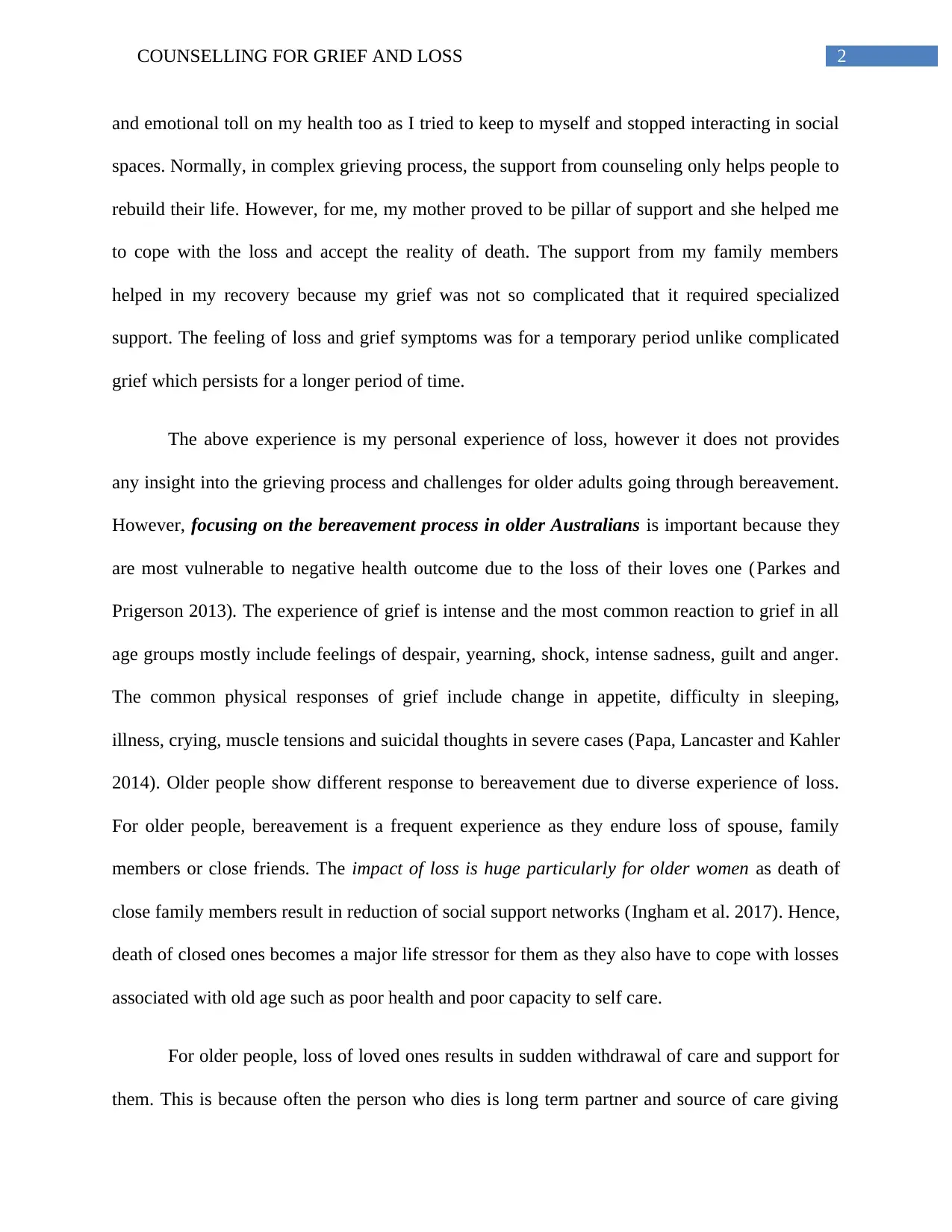
2COUNSELLING FOR GRIEF AND LOSS
and emotional toll on my health too as I tried to keep to myself and stopped interacting in social
spaces. Normally, in complex grieving process, the support from counseling only helps people to
rebuild their life. However, for me, my mother proved to be pillar of support and she helped me
to cope with the loss and accept the reality of death. The support from my family members
helped in my recovery because my grief was not so complicated that it required specialized
support. The feeling of loss and grief symptoms was for a temporary period unlike complicated
grief which persists for a longer period of time.
The above experience is my personal experience of loss, however it does not provides
any insight into the grieving process and challenges for older adults going through bereavement.
However, focusing on the bereavement process in older Australians is important because they
are most vulnerable to negative health outcome due to the loss of their loves one (Parkes and
Prigerson 2013). The experience of grief is intense and the most common reaction to grief in all
age groups mostly include feelings of despair, yearning, shock, intense sadness, guilt and anger.
The common physical responses of grief include change in appetite, difficulty in sleeping,
illness, crying, muscle tensions and suicidal thoughts in severe cases (Papa, Lancaster and Kahler
2014). Older people show different response to bereavement due to diverse experience of loss.
For older people, bereavement is a frequent experience as they endure loss of spouse, family
members or close friends. The impact of loss is huge particularly for older women as death of
close family members result in reduction of social support networks (Ingham et al. 2017). Hence,
death of closed ones becomes a major life stressor for them as they also have to cope with losses
associated with old age such as poor health and poor capacity to self care.
For older people, loss of loved ones results in sudden withdrawal of care and support for
them. This is because often the person who dies is long term partner and source of care giving
and emotional toll on my health too as I tried to keep to myself and stopped interacting in social
spaces. Normally, in complex grieving process, the support from counseling only helps people to
rebuild their life. However, for me, my mother proved to be pillar of support and she helped me
to cope with the loss and accept the reality of death. The support from my family members
helped in my recovery because my grief was not so complicated that it required specialized
support. The feeling of loss and grief symptoms was for a temporary period unlike complicated
grief which persists for a longer period of time.
The above experience is my personal experience of loss, however it does not provides
any insight into the grieving process and challenges for older adults going through bereavement.
However, focusing on the bereavement process in older Australians is important because they
are most vulnerable to negative health outcome due to the loss of their loves one (Parkes and
Prigerson 2013). The experience of grief is intense and the most common reaction to grief in all
age groups mostly include feelings of despair, yearning, shock, intense sadness, guilt and anger.
The common physical responses of grief include change in appetite, difficulty in sleeping,
illness, crying, muscle tensions and suicidal thoughts in severe cases (Papa, Lancaster and Kahler
2014). Older people show different response to bereavement due to diverse experience of loss.
For older people, bereavement is a frequent experience as they endure loss of spouse, family
members or close friends. The impact of loss is huge particularly for older women as death of
close family members result in reduction of social support networks (Ingham et al. 2017). Hence,
death of closed ones becomes a major life stressor for them as they also have to cope with losses
associated with old age such as poor health and poor capacity to self care.
For older people, loss of loved ones results in sudden withdrawal of care and support for
them. This is because often the person who dies is long term partner and source of care giving
⊘ This is a preview!⊘
Do you want full access?
Subscribe today to unlock all pages.

Trusted by 1+ million students worldwide
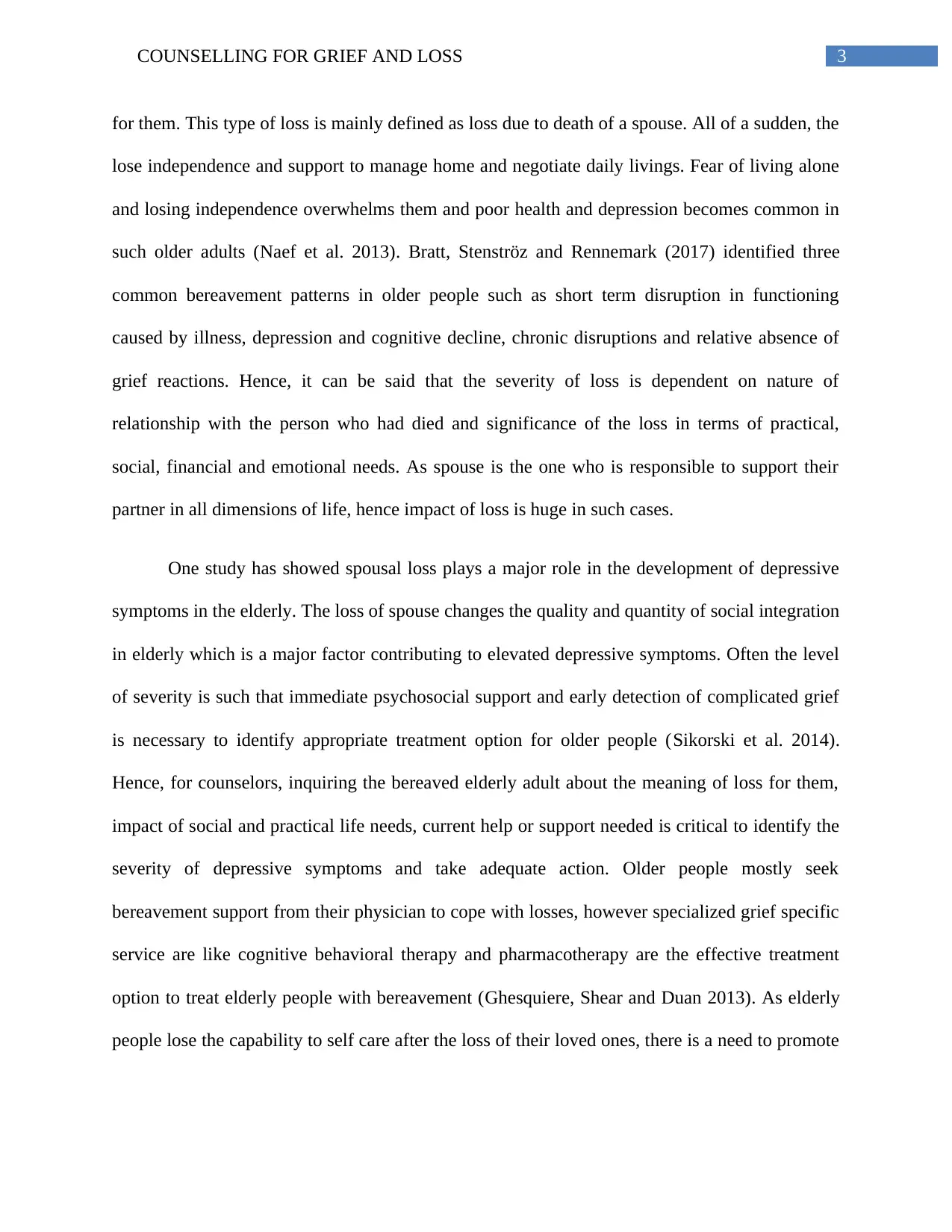
3COUNSELLING FOR GRIEF AND LOSS
for them. This type of loss is mainly defined as loss due to death of a spouse. All of a sudden, the
lose independence and support to manage home and negotiate daily livings. Fear of living alone
and losing independence overwhelms them and poor health and depression becomes common in
such older adults (Naef et al. 2013). Bratt, Stenströz and Rennemark (2017) identified three
common bereavement patterns in older people such as short term disruption in functioning
caused by illness, depression and cognitive decline, chronic disruptions and relative absence of
grief reactions. Hence, it can be said that the severity of loss is dependent on nature of
relationship with the person who had died and significance of the loss in terms of practical,
social, financial and emotional needs. As spouse is the one who is responsible to support their
partner in all dimensions of life, hence impact of loss is huge in such cases.
One study has showed spousal loss plays a major role in the development of depressive
symptoms in the elderly. The loss of spouse changes the quality and quantity of social integration
in elderly which is a major factor contributing to elevated depressive symptoms. Often the level
of severity is such that immediate psychosocial support and early detection of complicated grief
is necessary to identify appropriate treatment option for older people (Sikorski et al. 2014).
Hence, for counselors, inquiring the bereaved elderly adult about the meaning of loss for them,
impact of social and practical life needs, current help or support needed is critical to identify the
severity of depressive symptoms and take adequate action. Older people mostly seek
bereavement support from their physician to cope with losses, however specialized grief specific
service are like cognitive behavioral therapy and pharmacotherapy are the effective treatment
option to treat elderly people with bereavement (Ghesquiere, Shear and Duan 2013). As elderly
people lose the capability to self care after the loss of their loved ones, there is a need to promote
for them. This type of loss is mainly defined as loss due to death of a spouse. All of a sudden, the
lose independence and support to manage home and negotiate daily livings. Fear of living alone
and losing independence overwhelms them and poor health and depression becomes common in
such older adults (Naef et al. 2013). Bratt, Stenströz and Rennemark (2017) identified three
common bereavement patterns in older people such as short term disruption in functioning
caused by illness, depression and cognitive decline, chronic disruptions and relative absence of
grief reactions. Hence, it can be said that the severity of loss is dependent on nature of
relationship with the person who had died and significance of the loss in terms of practical,
social, financial and emotional needs. As spouse is the one who is responsible to support their
partner in all dimensions of life, hence impact of loss is huge in such cases.
One study has showed spousal loss plays a major role in the development of depressive
symptoms in the elderly. The loss of spouse changes the quality and quantity of social integration
in elderly which is a major factor contributing to elevated depressive symptoms. Often the level
of severity is such that immediate psychosocial support and early detection of complicated grief
is necessary to identify appropriate treatment option for older people (Sikorski et al. 2014).
Hence, for counselors, inquiring the bereaved elderly adult about the meaning of loss for them,
impact of social and practical life needs, current help or support needed is critical to identify the
severity of depressive symptoms and take adequate action. Older people mostly seek
bereavement support from their physician to cope with losses, however specialized grief specific
service are like cognitive behavioral therapy and pharmacotherapy are the effective treatment
option to treat elderly people with bereavement (Ghesquiere, Shear and Duan 2013). As elderly
people lose the capability to self care after the loss of their loved ones, there is a need to promote
Paraphrase This Document
Need a fresh take? Get an instant paraphrase of this document with our AI Paraphraser
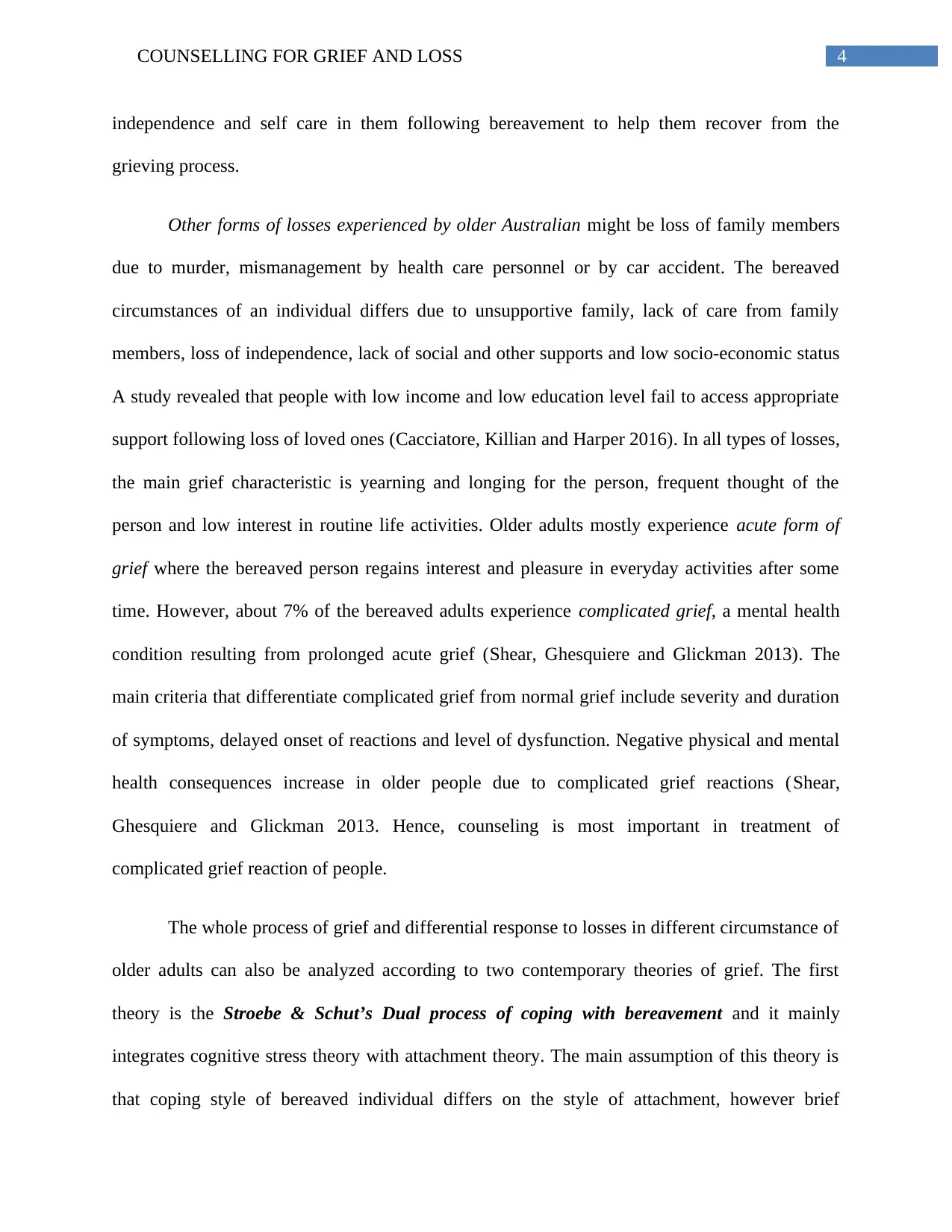
4COUNSELLING FOR GRIEF AND LOSS
independence and self care in them following bereavement to help them recover from the
grieving process.
Other forms of losses experienced by older Australian might be loss of family members
due to murder, mismanagement by health care personnel or by car accident. The bereaved
circumstances of an individual differs due to unsupportive family, lack of care from family
members, loss of independence, lack of social and other supports and low socio-economic status
A study revealed that people with low income and low education level fail to access appropriate
support following loss of loved ones (Cacciatore, Killian and Harper 2016). In all types of losses,
the main grief characteristic is yearning and longing for the person, frequent thought of the
person and low interest in routine life activities. Older adults mostly experience acute form of
grief where the bereaved person regains interest and pleasure in everyday activities after some
time. However, about 7% of the bereaved adults experience complicated grief, a mental health
condition resulting from prolonged acute grief (Shear, Ghesquiere and Glickman 2013). The
main criteria that differentiate complicated grief from normal grief include severity and duration
of symptoms, delayed onset of reactions and level of dysfunction. Negative physical and mental
health consequences increase in older people due to complicated grief reactions (Shear,
Ghesquiere and Glickman 2013. Hence, counseling is most important in treatment of
complicated grief reaction of people.
The whole process of grief and differential response to losses in different circumstance of
older adults can also be analyzed according to two contemporary theories of grief. The first
theory is the Stroebe & Schut’s Dual process of coping with bereavement and it mainly
integrates cognitive stress theory with attachment theory. The main assumption of this theory is
that coping style of bereaved individual differs on the style of attachment, however brief
independence and self care in them following bereavement to help them recover from the
grieving process.
Other forms of losses experienced by older Australian might be loss of family members
due to murder, mismanagement by health care personnel or by car accident. The bereaved
circumstances of an individual differs due to unsupportive family, lack of care from family
members, loss of independence, lack of social and other supports and low socio-economic status
A study revealed that people with low income and low education level fail to access appropriate
support following loss of loved ones (Cacciatore, Killian and Harper 2016). In all types of losses,
the main grief characteristic is yearning and longing for the person, frequent thought of the
person and low interest in routine life activities. Older adults mostly experience acute form of
grief where the bereaved person regains interest and pleasure in everyday activities after some
time. However, about 7% of the bereaved adults experience complicated grief, a mental health
condition resulting from prolonged acute grief (Shear, Ghesquiere and Glickman 2013). The
main criteria that differentiate complicated grief from normal grief include severity and duration
of symptoms, delayed onset of reactions and level of dysfunction. Negative physical and mental
health consequences increase in older people due to complicated grief reactions (Shear,
Ghesquiere and Glickman 2013. Hence, counseling is most important in treatment of
complicated grief reaction of people.
The whole process of grief and differential response to losses in different circumstance of
older adults can also be analyzed according to two contemporary theories of grief. The first
theory is the Stroebe & Schut’s Dual process of coping with bereavement and it mainly
integrates cognitive stress theory with attachment theory. The main assumption of this theory is
that coping style of bereaved individual differs on the style of attachment, however brief
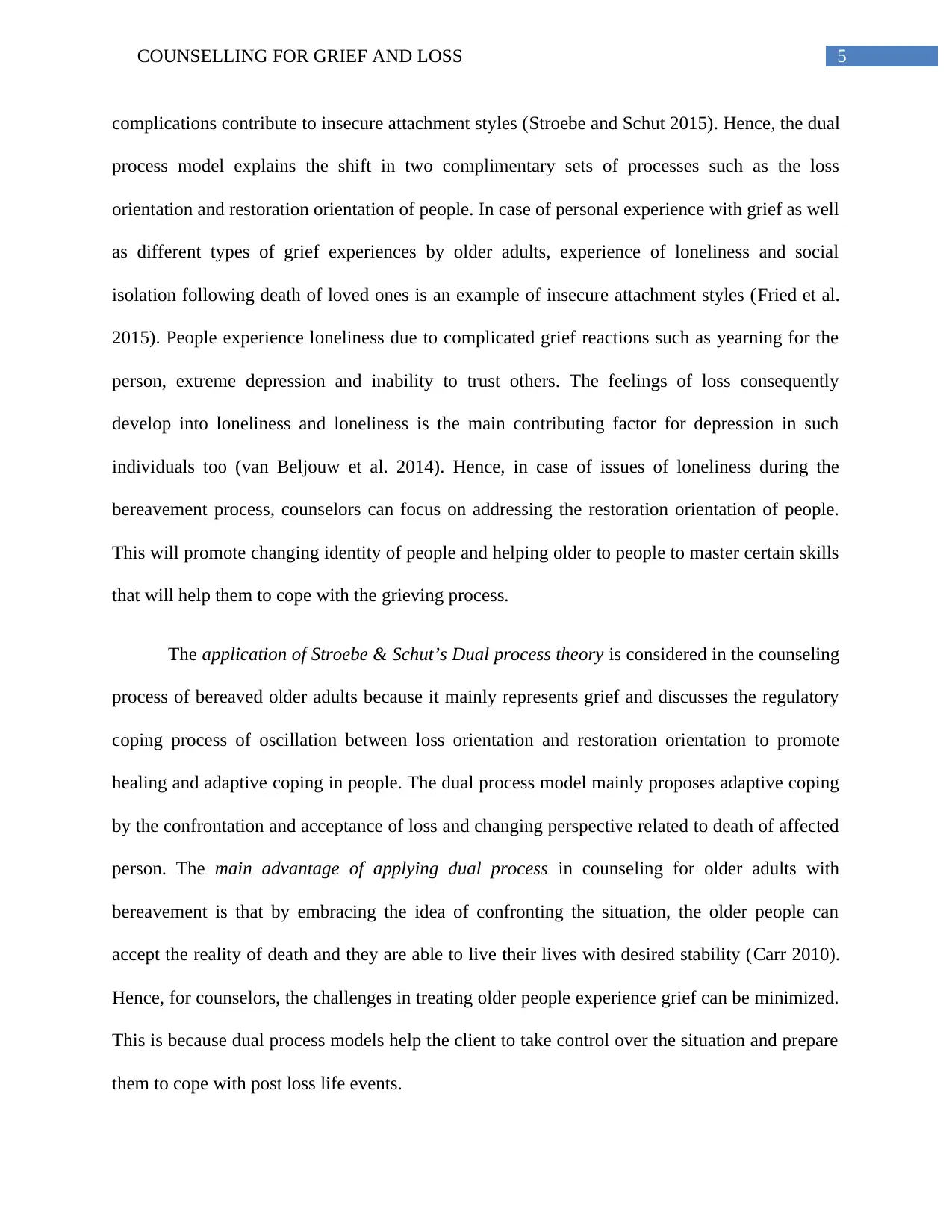
5COUNSELLING FOR GRIEF AND LOSS
complications contribute to insecure attachment styles (Stroebe and Schut 2015). Hence, the dual
process model explains the shift in two complimentary sets of processes such as the loss
orientation and restoration orientation of people. In case of personal experience with grief as well
as different types of grief experiences by older adults, experience of loneliness and social
isolation following death of loved ones is an example of insecure attachment styles (Fried et al.
2015). People experience loneliness due to complicated grief reactions such as yearning for the
person, extreme depression and inability to trust others. The feelings of loss consequently
develop into loneliness and loneliness is the main contributing factor for depression in such
individuals too (van Beljouw et al. 2014). Hence, in case of issues of loneliness during the
bereavement process, counselors can focus on addressing the restoration orientation of people.
This will promote changing identity of people and helping older to people to master certain skills
that will help them to cope with the grieving process.
The application of Stroebe & Schut’s Dual process theory is considered in the counseling
process of bereaved older adults because it mainly represents grief and discusses the regulatory
coping process of oscillation between loss orientation and restoration orientation to promote
healing and adaptive coping in people. The dual process model mainly proposes adaptive coping
by the confrontation and acceptance of loss and changing perspective related to death of affected
person. The main advantage of applying dual process in counseling for older adults with
bereavement is that by embracing the idea of confronting the situation, the older people can
accept the reality of death and they are able to live their lives with desired stability (Carr 2010).
Hence, for counselors, the challenges in treating older people experience grief can be minimized.
This is because dual process models help the client to take control over the situation and prepare
them to cope with post loss life events.
complications contribute to insecure attachment styles (Stroebe and Schut 2015). Hence, the dual
process model explains the shift in two complimentary sets of processes such as the loss
orientation and restoration orientation of people. In case of personal experience with grief as well
as different types of grief experiences by older adults, experience of loneliness and social
isolation following death of loved ones is an example of insecure attachment styles (Fried et al.
2015). People experience loneliness due to complicated grief reactions such as yearning for the
person, extreme depression and inability to trust others. The feelings of loss consequently
develop into loneliness and loneliness is the main contributing factor for depression in such
individuals too (van Beljouw et al. 2014). Hence, in case of issues of loneliness during the
bereavement process, counselors can focus on addressing the restoration orientation of people.
This will promote changing identity of people and helping older to people to master certain skills
that will help them to cope with the grieving process.
The application of Stroebe & Schut’s Dual process theory is considered in the counseling
process of bereaved older adults because it mainly represents grief and discusses the regulatory
coping process of oscillation between loss orientation and restoration orientation to promote
healing and adaptive coping in people. The dual process model mainly proposes adaptive coping
by the confrontation and acceptance of loss and changing perspective related to death of affected
person. The main advantage of applying dual process in counseling for older adults with
bereavement is that by embracing the idea of confronting the situation, the older people can
accept the reality of death and they are able to live their lives with desired stability (Carr 2010).
Hence, for counselors, the challenges in treating older people experience grief can be minimized.
This is because dual process models help the client to take control over the situation and prepare
them to cope with post loss life events.
⊘ This is a preview!⊘
Do you want full access?
Subscribe today to unlock all pages.

Trusted by 1+ million students worldwide
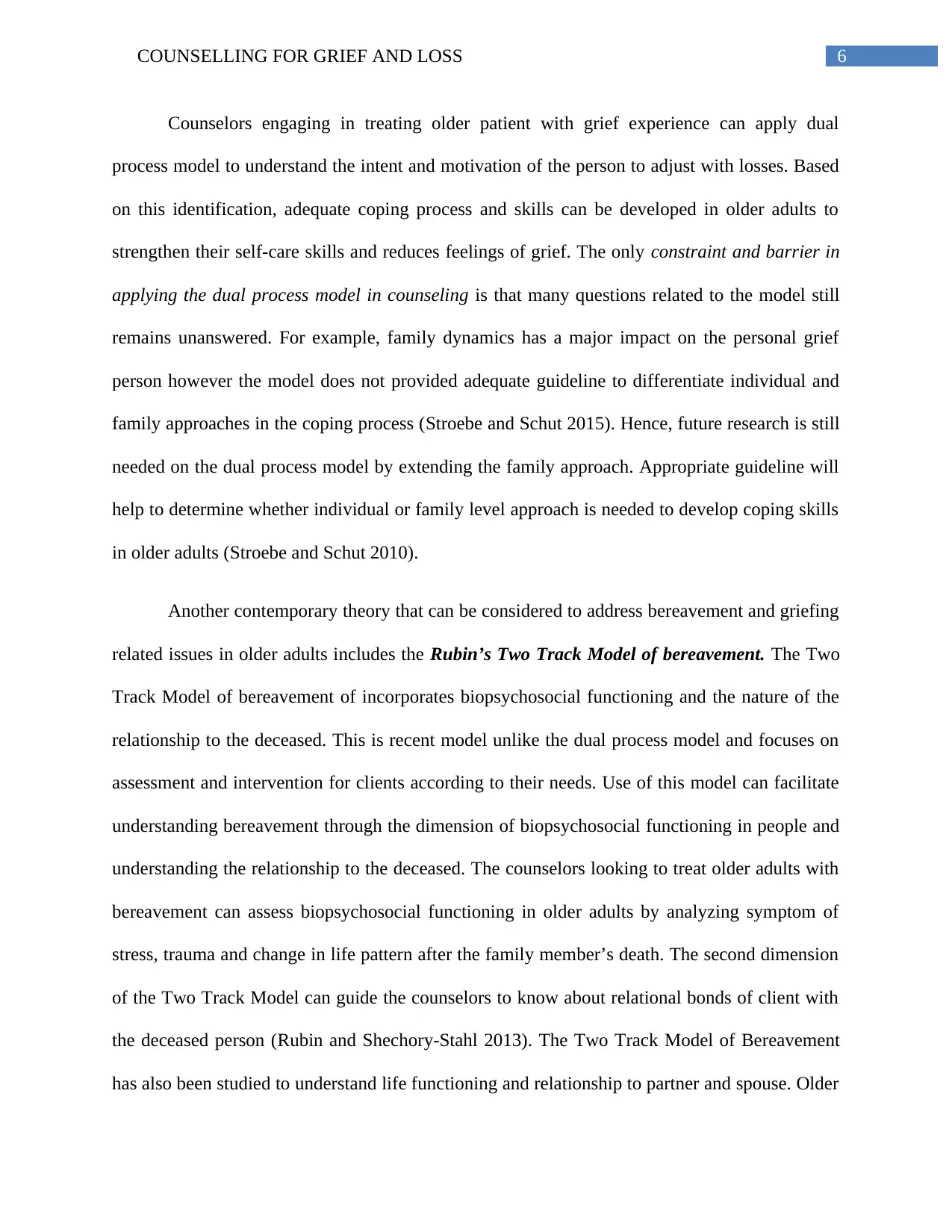
6COUNSELLING FOR GRIEF AND LOSS
Counselors engaging in treating older patient with grief experience can apply dual
process model to understand the intent and motivation of the person to adjust with losses. Based
on this identification, adequate coping process and skills can be developed in older adults to
strengthen their self-care skills and reduces feelings of grief. The only constraint and barrier in
applying the dual process model in counseling is that many questions related to the model still
remains unanswered. For example, family dynamics has a major impact on the personal grief
person however the model does not provided adequate guideline to differentiate individual and
family approaches in the coping process (Stroebe and Schut 2015). Hence, future research is still
needed on the dual process model by extending the family approach. Appropriate guideline will
help to determine whether individual or family level approach is needed to develop coping skills
in older adults (Stroebe and Schut 2010).
Another contemporary theory that can be considered to address bereavement and griefing
related issues in older adults includes the Rubin’s Two Track Model of bereavement. The Two
Track Model of bereavement of incorporates biopsychosocial functioning and the nature of the
relationship to the deceased. This is recent model unlike the dual process model and focuses on
assessment and intervention for clients according to their needs. Use of this model can facilitate
understanding bereavement through the dimension of biopsychosocial functioning in people and
understanding the relationship to the deceased. The counselors looking to treat older adults with
bereavement can assess biopsychosocial functioning in older adults by analyzing symptom of
stress, trauma and change in life pattern after the family member’s death. The second dimension
of the Two Track Model can guide the counselors to know about relational bonds of client with
the deceased person (Rubin and Shechory-Stahl 2013). The Two Track Model of Bereavement
has also been studied to understand life functioning and relationship to partner and spouse. Older
Counselors engaging in treating older patient with grief experience can apply dual
process model to understand the intent and motivation of the person to adjust with losses. Based
on this identification, adequate coping process and skills can be developed in older adults to
strengthen their self-care skills and reduces feelings of grief. The only constraint and barrier in
applying the dual process model in counseling is that many questions related to the model still
remains unanswered. For example, family dynamics has a major impact on the personal grief
person however the model does not provided adequate guideline to differentiate individual and
family approaches in the coping process (Stroebe and Schut 2015). Hence, future research is still
needed on the dual process model by extending the family approach. Appropriate guideline will
help to determine whether individual or family level approach is needed to develop coping skills
in older adults (Stroebe and Schut 2010).
Another contemporary theory that can be considered to address bereavement and griefing
related issues in older adults includes the Rubin’s Two Track Model of bereavement. The Two
Track Model of bereavement of incorporates biopsychosocial functioning and the nature of the
relationship to the deceased. This is recent model unlike the dual process model and focuses on
assessment and intervention for clients according to their needs. Use of this model can facilitate
understanding bereavement through the dimension of biopsychosocial functioning in people and
understanding the relationship to the deceased. The counselors looking to treat older adults with
bereavement can assess biopsychosocial functioning in older adults by analyzing symptom of
stress, trauma and change in life pattern after the family member’s death. The second dimension
of the Two Track Model can guide the counselors to know about relational bonds of client with
the deceased person (Rubin and Shechory-Stahl 2013). The Two Track Model of Bereavement
has also been studied to understand life functioning and relationship to partner and spouse. Older
Paraphrase This Document
Need a fresh take? Get an instant paraphrase of this document with our AI Paraphraser
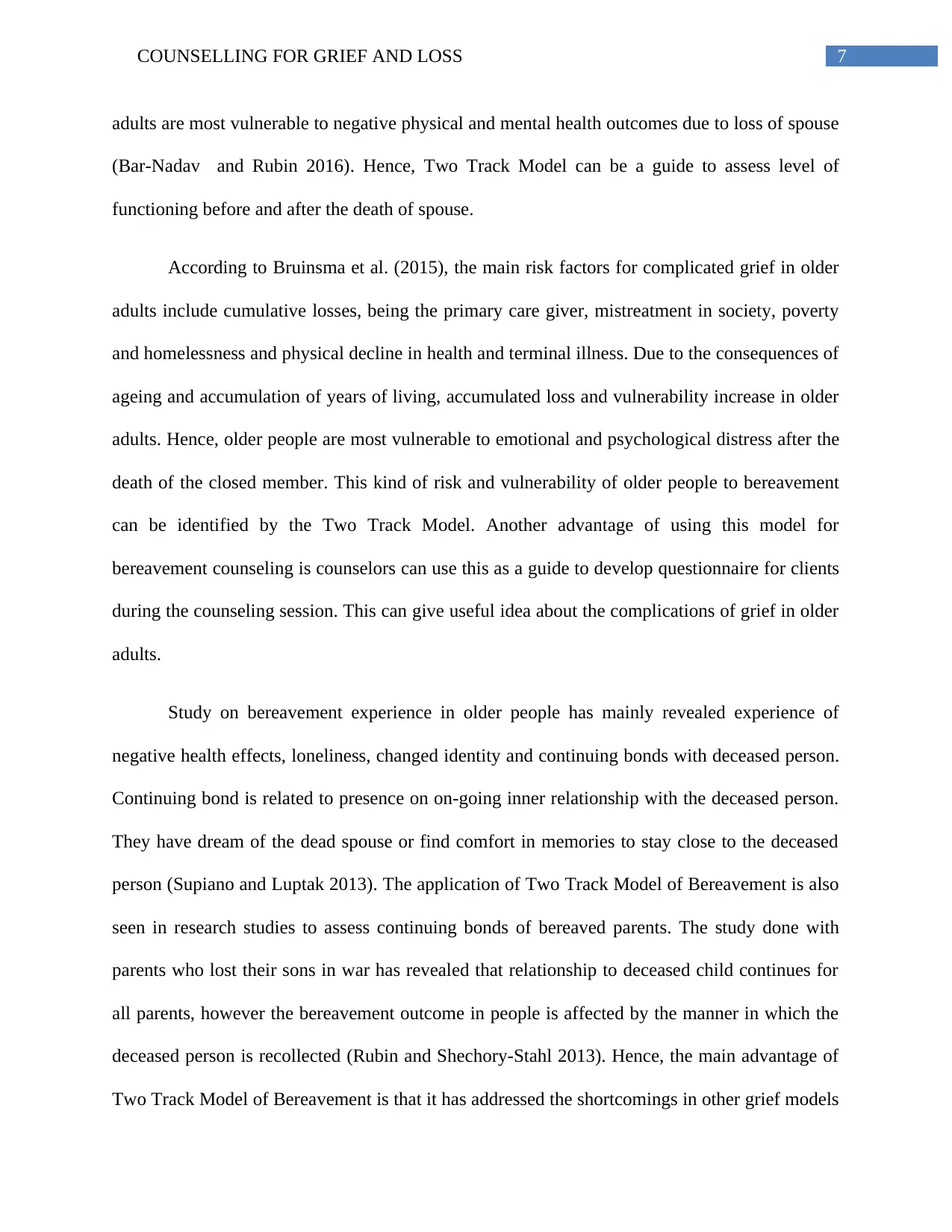
7COUNSELLING FOR GRIEF AND LOSS
adults are most vulnerable to negative physical and mental health outcomes due to loss of spouse
(Bar-Nadav and Rubin 2016). Hence, Two Track Model can be a guide to assess level of
functioning before and after the death of spouse.
According to Bruinsma et al. (2015), the main risk factors for complicated grief in older
adults include cumulative losses, being the primary care giver, mistreatment in society, poverty
and homelessness and physical decline in health and terminal illness. Due to the consequences of
ageing and accumulation of years of living, accumulated loss and vulnerability increase in older
adults. Hence, older people are most vulnerable to emotional and psychological distress after the
death of the closed member. This kind of risk and vulnerability of older people to bereavement
can be identified by the Two Track Model. Another advantage of using this model for
bereavement counseling is counselors can use this as a guide to develop questionnaire for clients
during the counseling session. This can give useful idea about the complications of grief in older
adults.
Study on bereavement experience in older people has mainly revealed experience of
negative health effects, loneliness, changed identity and continuing bonds with deceased person.
Continuing bond is related to presence on on-going inner relationship with the deceased person.
They have dream of the dead spouse or find comfort in memories to stay close to the deceased
person (Supiano and Luptak 2013). The application of Two Track Model of Bereavement is also
seen in research studies to assess continuing bonds of bereaved parents. The study done with
parents who lost their sons in war has revealed that relationship to deceased child continues for
all parents, however the bereavement outcome in people is affected by the manner in which the
deceased person is recollected (Rubin and Shechory-Stahl 2013). Hence, the main advantage of
Two Track Model of Bereavement is that it has addressed the shortcomings in other grief models
adults are most vulnerable to negative physical and mental health outcomes due to loss of spouse
(Bar-Nadav and Rubin 2016). Hence, Two Track Model can be a guide to assess level of
functioning before and after the death of spouse.
According to Bruinsma et al. (2015), the main risk factors for complicated grief in older
adults include cumulative losses, being the primary care giver, mistreatment in society, poverty
and homelessness and physical decline in health and terminal illness. Due to the consequences of
ageing and accumulation of years of living, accumulated loss and vulnerability increase in older
adults. Hence, older people are most vulnerable to emotional and psychological distress after the
death of the closed member. This kind of risk and vulnerability of older people to bereavement
can be identified by the Two Track Model. Another advantage of using this model for
bereavement counseling is counselors can use this as a guide to develop questionnaire for clients
during the counseling session. This can give useful idea about the complications of grief in older
adults.
Study on bereavement experience in older people has mainly revealed experience of
negative health effects, loneliness, changed identity and continuing bonds with deceased person.
Continuing bond is related to presence on on-going inner relationship with the deceased person.
They have dream of the dead spouse or find comfort in memories to stay close to the deceased
person (Supiano and Luptak 2013). The application of Two Track Model of Bereavement is also
seen in research studies to assess continuing bonds of bereaved parents. The study done with
parents who lost their sons in war has revealed that relationship to deceased child continues for
all parents, however the bereavement outcome in people is affected by the manner in which the
deceased person is recollected (Rubin and Shechory-Stahl 2013). Hence, the main advantage of
Two Track Model of Bereavement is that it has addressed the shortcomings in other grief models
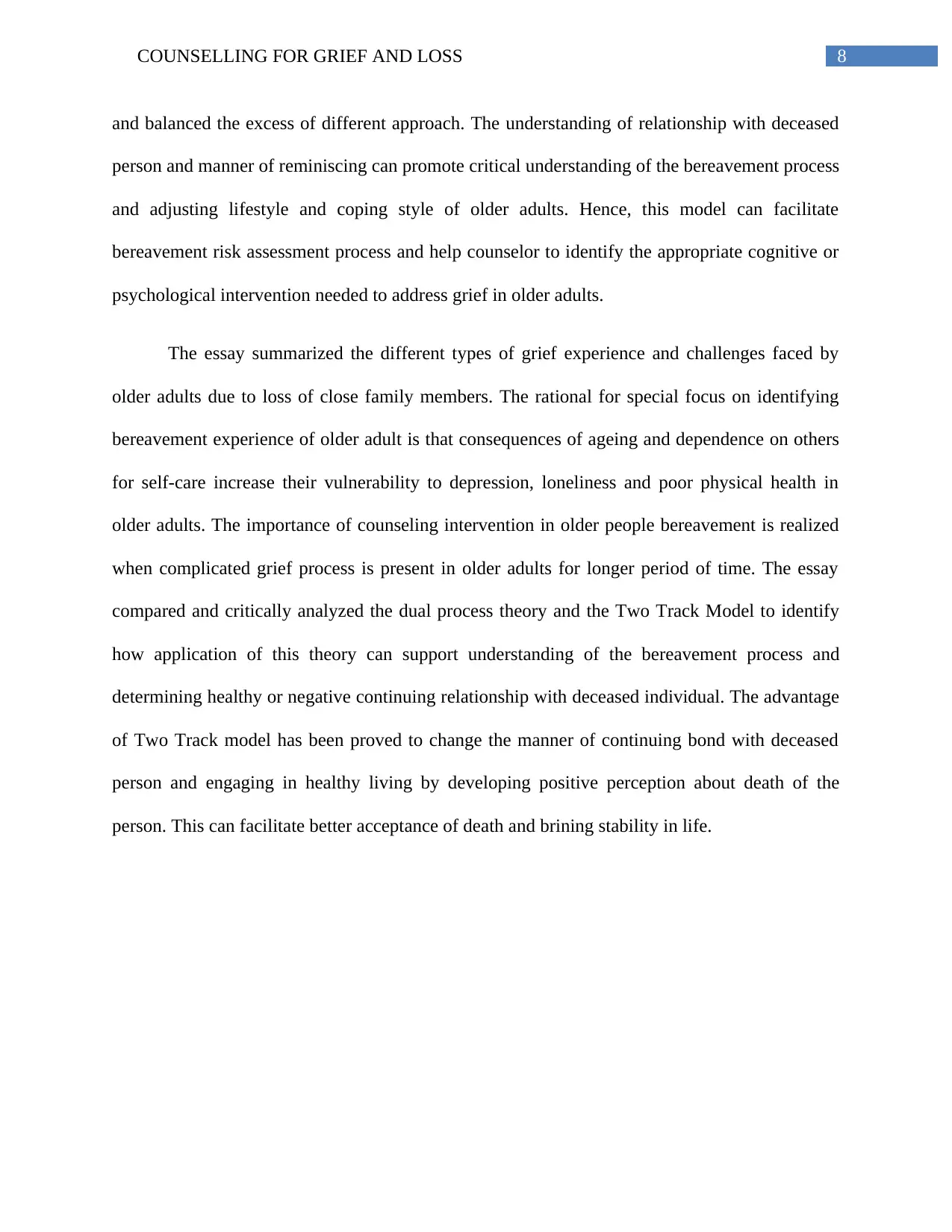
8COUNSELLING FOR GRIEF AND LOSS
and balanced the excess of different approach. The understanding of relationship with deceased
person and manner of reminiscing can promote critical understanding of the bereavement process
and adjusting lifestyle and coping style of older adults. Hence, this model can facilitate
bereavement risk assessment process and help counselor to identify the appropriate cognitive or
psychological intervention needed to address grief in older adults.
The essay summarized the different types of grief experience and challenges faced by
older adults due to loss of close family members. The rational for special focus on identifying
bereavement experience of older adult is that consequences of ageing and dependence on others
for self-care increase their vulnerability to depression, loneliness and poor physical health in
older adults. The importance of counseling intervention in older people bereavement is realized
when complicated grief process is present in older adults for longer period of time. The essay
compared and critically analyzed the dual process theory and the Two Track Model to identify
how application of this theory can support understanding of the bereavement process and
determining healthy or negative continuing relationship with deceased individual. The advantage
of Two Track model has been proved to change the manner of continuing bond with deceased
person and engaging in healthy living by developing positive perception about death of the
person. This can facilitate better acceptance of death and brining stability in life.
and balanced the excess of different approach. The understanding of relationship with deceased
person and manner of reminiscing can promote critical understanding of the bereavement process
and adjusting lifestyle and coping style of older adults. Hence, this model can facilitate
bereavement risk assessment process and help counselor to identify the appropriate cognitive or
psychological intervention needed to address grief in older adults.
The essay summarized the different types of grief experience and challenges faced by
older adults due to loss of close family members. The rational for special focus on identifying
bereavement experience of older adult is that consequences of ageing and dependence on others
for self-care increase their vulnerability to depression, loneliness and poor physical health in
older adults. The importance of counseling intervention in older people bereavement is realized
when complicated grief process is present in older adults for longer period of time. The essay
compared and critically analyzed the dual process theory and the Two Track Model to identify
how application of this theory can support understanding of the bereavement process and
determining healthy or negative continuing relationship with deceased individual. The advantage
of Two Track model has been proved to change the manner of continuing bond with deceased
person and engaging in healthy living by developing positive perception about death of the
person. This can facilitate better acceptance of death and brining stability in life.
⊘ This is a preview!⊘
Do you want full access?
Subscribe today to unlock all pages.

Trusted by 1+ million students worldwide
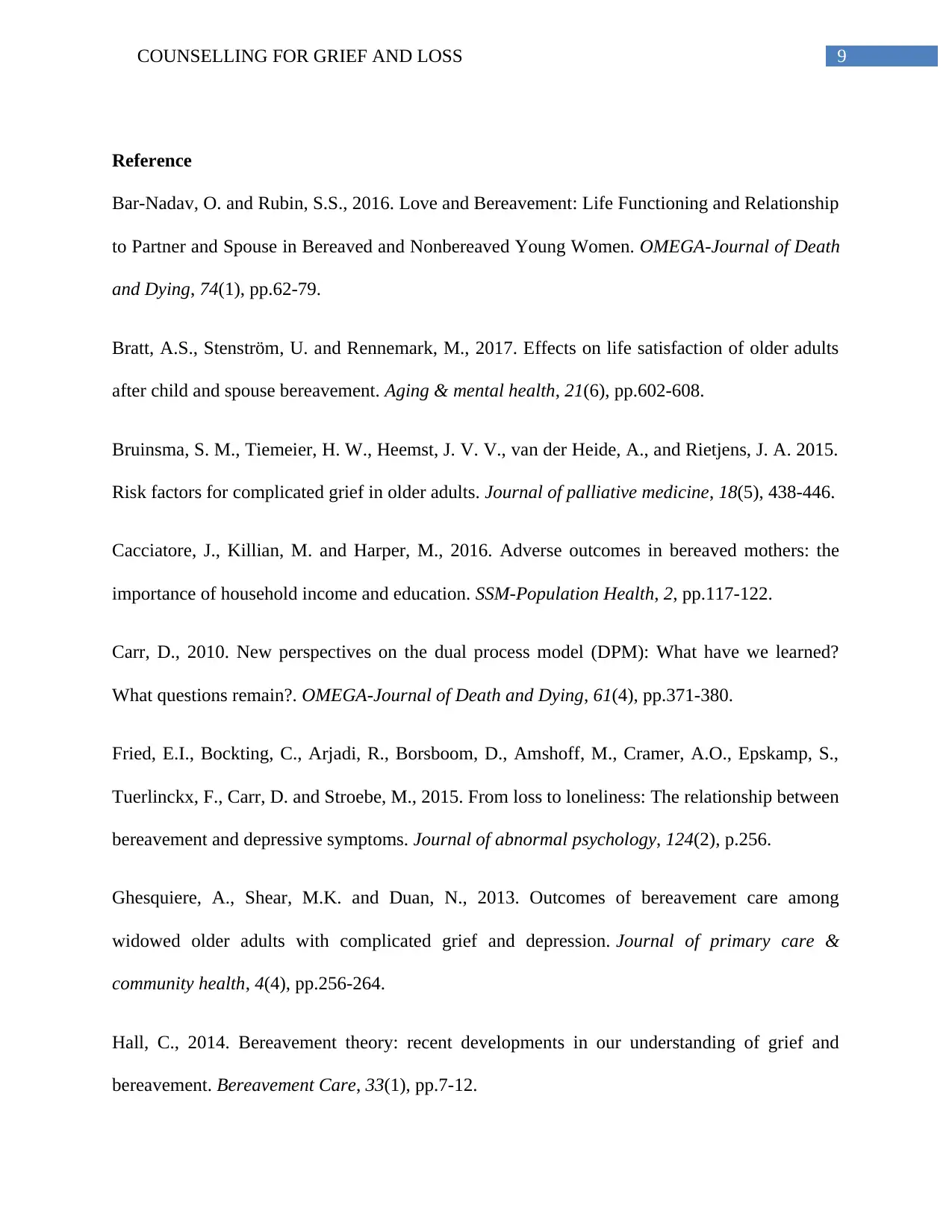
9COUNSELLING FOR GRIEF AND LOSS
Reference
Bar-Nadav, O. and Rubin, S.S., 2016. Love and Bereavement: Life Functioning and Relationship
to Partner and Spouse in Bereaved and Nonbereaved Young Women. OMEGA-Journal of Death
and Dying, 74(1), pp.62-79.
Bratt, A.S., Stenström, U. and Rennemark, M., 2017. Effects on life satisfaction of older adults
after child and spouse bereavement. Aging & mental health, 21(6), pp.602-608.
Bruinsma, S. M., Tiemeier, H. W., Heemst, J. V. V., van der Heide, A., and Rietjens, J. A. 2015.
Risk factors for complicated grief in older adults. Journal of palliative medicine, 18(5), 438-446.
Cacciatore, J., Killian, M. and Harper, M., 2016. Adverse outcomes in bereaved mothers: the
importance of household income and education. SSM-Population Health, 2, pp.117-122.
Carr, D., 2010. New perspectives on the dual process model (DPM): What have we learned?
What questions remain?. OMEGA-Journal of Death and Dying, 61(4), pp.371-380.
Fried, E.I., Bockting, C., Arjadi, R., Borsboom, D., Amshoff, M., Cramer, A.O., Epskamp, S.,
Tuerlinckx, F., Carr, D. and Stroebe, M., 2015. From loss to loneliness: The relationship between
bereavement and depressive symptoms. Journal of abnormal psychology, 124(2), p.256.
Ghesquiere, A., Shear, M.K. and Duan, N., 2013. Outcomes of bereavement care among
widowed older adults with complicated grief and depression. Journal of primary care &
community health, 4(4), pp.256-264.
Hall, C., 2014. Bereavement theory: recent developments in our understanding of grief and
bereavement. Bereavement Care, 33(1), pp.7-12.
Reference
Bar-Nadav, O. and Rubin, S.S., 2016. Love and Bereavement: Life Functioning and Relationship
to Partner and Spouse in Bereaved and Nonbereaved Young Women. OMEGA-Journal of Death
and Dying, 74(1), pp.62-79.
Bratt, A.S., Stenström, U. and Rennemark, M., 2017. Effects on life satisfaction of older adults
after child and spouse bereavement. Aging & mental health, 21(6), pp.602-608.
Bruinsma, S. M., Tiemeier, H. W., Heemst, J. V. V., van der Heide, A., and Rietjens, J. A. 2015.
Risk factors for complicated grief in older adults. Journal of palliative medicine, 18(5), 438-446.
Cacciatore, J., Killian, M. and Harper, M., 2016. Adverse outcomes in bereaved mothers: the
importance of household income and education. SSM-Population Health, 2, pp.117-122.
Carr, D., 2010. New perspectives on the dual process model (DPM): What have we learned?
What questions remain?. OMEGA-Journal of Death and Dying, 61(4), pp.371-380.
Fried, E.I., Bockting, C., Arjadi, R., Borsboom, D., Amshoff, M., Cramer, A.O., Epskamp, S.,
Tuerlinckx, F., Carr, D. and Stroebe, M., 2015. From loss to loneliness: The relationship between
bereavement and depressive symptoms. Journal of abnormal psychology, 124(2), p.256.
Ghesquiere, A., Shear, M.K. and Duan, N., 2013. Outcomes of bereavement care among
widowed older adults with complicated grief and depression. Journal of primary care &
community health, 4(4), pp.256-264.
Hall, C., 2014. Bereavement theory: recent developments in our understanding of grief and
bereavement. Bereavement Care, 33(1), pp.7-12.
Paraphrase This Document
Need a fresh take? Get an instant paraphrase of this document with our AI Paraphraser
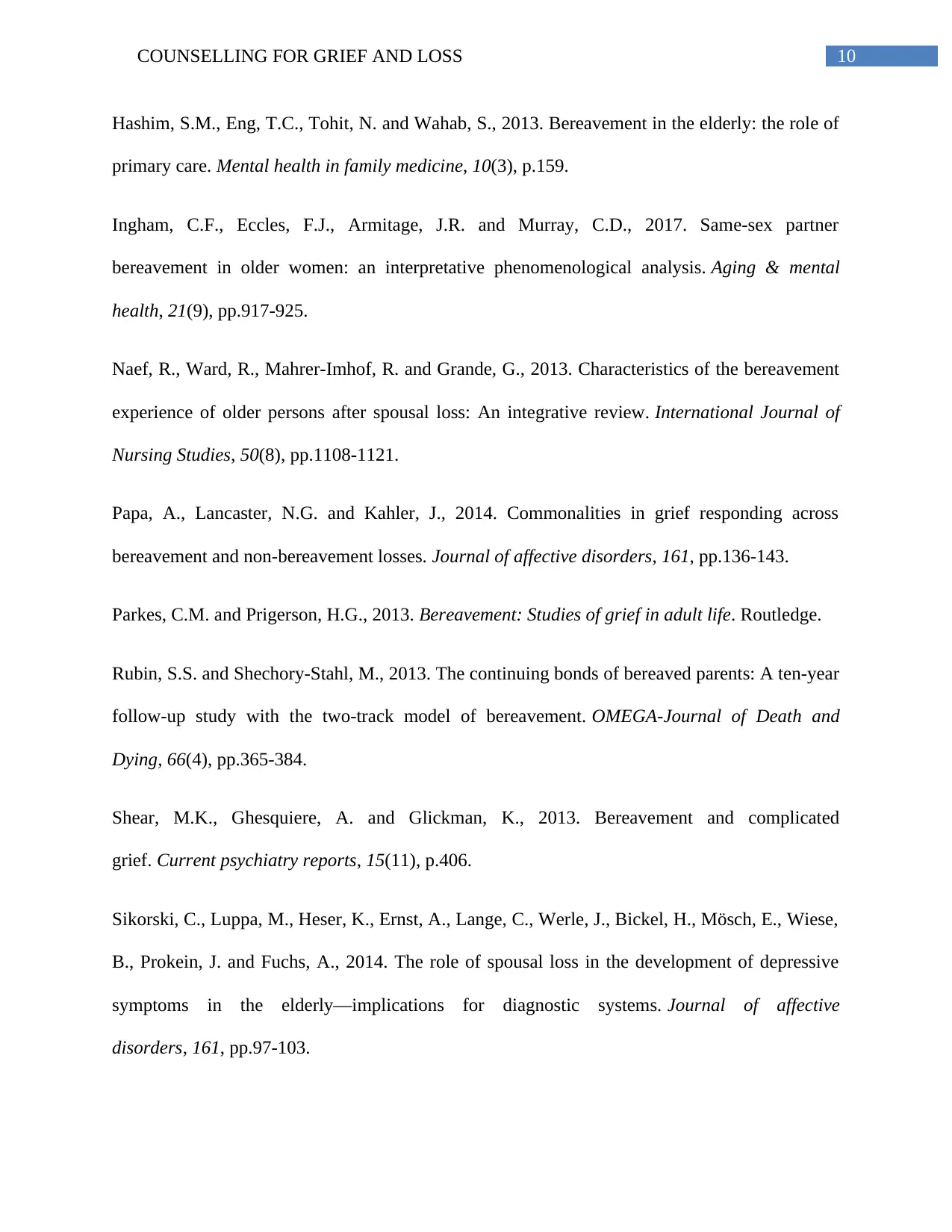
10COUNSELLING FOR GRIEF AND LOSS
Hashim, S.M., Eng, T.C., Tohit, N. and Wahab, S., 2013. Bereavement in the elderly: the role of
primary care. Mental health in family medicine, 10(3), p.159.
Ingham, C.F., Eccles, F.J., Armitage, J.R. and Murray, C.D., 2017. Same-sex partner
bereavement in older women: an interpretative phenomenological analysis. Aging & mental
health, 21(9), pp.917-925.
Naef, R., Ward, R., Mahrer-Imhof, R. and Grande, G., 2013. Characteristics of the bereavement
experience of older persons after spousal loss: An integrative review. International Journal of
Nursing Studies, 50(8), pp.1108-1121.
Papa, A., Lancaster, N.G. and Kahler, J., 2014. Commonalities in grief responding across
bereavement and non-bereavement losses. Journal of affective disorders, 161, pp.136-143.
Parkes, C.M. and Prigerson, H.G., 2013. Bereavement: Studies of grief in adult life. Routledge.
Rubin, S.S. and Shechory-Stahl, M., 2013. The continuing bonds of bereaved parents: A ten-year
follow-up study with the two-track model of bereavement. OMEGA-Journal of Death and
Dying, 66(4), pp.365-384.
Shear, M.K., Ghesquiere, A. and Glickman, K., 2013. Bereavement and complicated
grief. Current psychiatry reports, 15(11), p.406.
Sikorski, C., Luppa, M., Heser, K., Ernst, A., Lange, C., Werle, J., Bickel, H., Mösch, E., Wiese,
B., Prokein, J. and Fuchs, A., 2014. The role of spousal loss in the development of depressive
symptoms in the elderly—implications for diagnostic systems. Journal of affective
disorders, 161, pp.97-103.
Hashim, S.M., Eng, T.C., Tohit, N. and Wahab, S., 2013. Bereavement in the elderly: the role of
primary care. Mental health in family medicine, 10(3), p.159.
Ingham, C.F., Eccles, F.J., Armitage, J.R. and Murray, C.D., 2017. Same-sex partner
bereavement in older women: an interpretative phenomenological analysis. Aging & mental
health, 21(9), pp.917-925.
Naef, R., Ward, R., Mahrer-Imhof, R. and Grande, G., 2013. Characteristics of the bereavement
experience of older persons after spousal loss: An integrative review. International Journal of
Nursing Studies, 50(8), pp.1108-1121.
Papa, A., Lancaster, N.G. and Kahler, J., 2014. Commonalities in grief responding across
bereavement and non-bereavement losses. Journal of affective disorders, 161, pp.136-143.
Parkes, C.M. and Prigerson, H.G., 2013. Bereavement: Studies of grief in adult life. Routledge.
Rubin, S.S. and Shechory-Stahl, M., 2013. The continuing bonds of bereaved parents: A ten-year
follow-up study with the two-track model of bereavement. OMEGA-Journal of Death and
Dying, 66(4), pp.365-384.
Shear, M.K., Ghesquiere, A. and Glickman, K., 2013. Bereavement and complicated
grief. Current psychiatry reports, 15(11), p.406.
Sikorski, C., Luppa, M., Heser, K., Ernst, A., Lange, C., Werle, J., Bickel, H., Mösch, E., Wiese,
B., Prokein, J. and Fuchs, A., 2014. The role of spousal loss in the development of depressive
symptoms in the elderly—implications for diagnostic systems. Journal of affective
disorders, 161, pp.97-103.
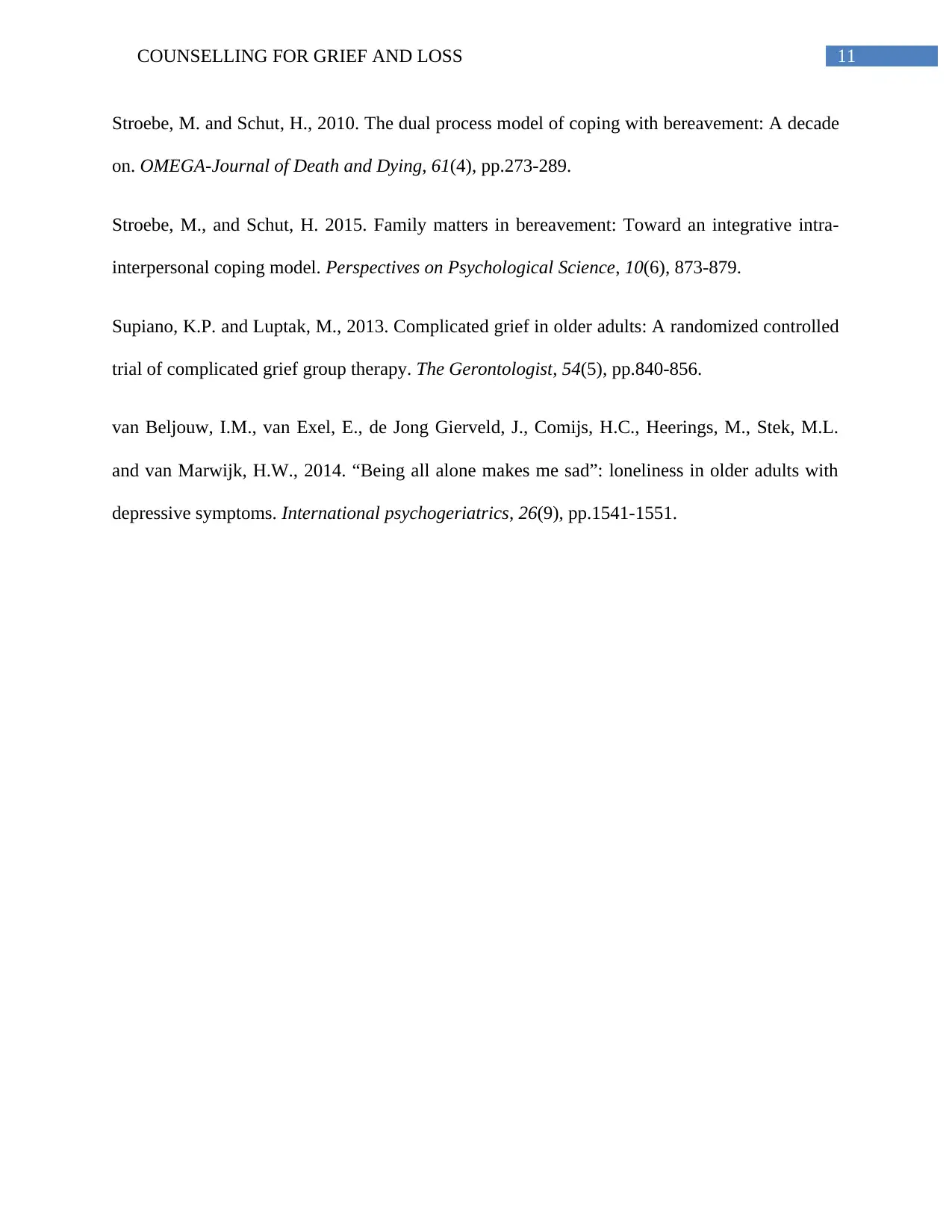
11COUNSELLING FOR GRIEF AND LOSS
Stroebe, M. and Schut, H., 2010. The dual process model of coping with bereavement: A decade
on. OMEGA-Journal of Death and Dying, 61(4), pp.273-289.
Stroebe, M., and Schut, H. 2015. Family matters in bereavement: Toward an integrative intra-
interpersonal coping model. Perspectives on Psychological Science, 10(6), 873-879.
Supiano, K.P. and Luptak, M., 2013. Complicated grief in older adults: A randomized controlled
trial of complicated grief group therapy. The Gerontologist, 54(5), pp.840-856.
van Beljouw, I.M., van Exel, E., de Jong Gierveld, J., Comijs, H.C., Heerings, M., Stek, M.L.
and van Marwijk, H.W., 2014. “Being all alone makes me sad”: loneliness in older adults with
depressive symptoms. International psychogeriatrics, 26(9), pp.1541-1551.
Stroebe, M. and Schut, H., 2010. The dual process model of coping with bereavement: A decade
on. OMEGA-Journal of Death and Dying, 61(4), pp.273-289.
Stroebe, M., and Schut, H. 2015. Family matters in bereavement: Toward an integrative intra-
interpersonal coping model. Perspectives on Psychological Science, 10(6), 873-879.
Supiano, K.P. and Luptak, M., 2013. Complicated grief in older adults: A randomized controlled
trial of complicated grief group therapy. The Gerontologist, 54(5), pp.840-856.
van Beljouw, I.M., van Exel, E., de Jong Gierveld, J., Comijs, H.C., Heerings, M., Stek, M.L.
and van Marwijk, H.W., 2014. “Being all alone makes me sad”: loneliness in older adults with
depressive symptoms. International psychogeriatrics, 26(9), pp.1541-1551.
⊘ This is a preview!⊘
Do you want full access?
Subscribe today to unlock all pages.

Trusted by 1+ million students worldwide
1 out of 12
Related Documents
Your All-in-One AI-Powered Toolkit for Academic Success.
+13062052269
info@desklib.com
Available 24*7 on WhatsApp / Email
![[object Object]](/_next/static/media/star-bottom.7253800d.svg)
Unlock your academic potential
Copyright © 2020–2025 A2Z Services. All Rights Reserved. Developed and managed by ZUCOL.





